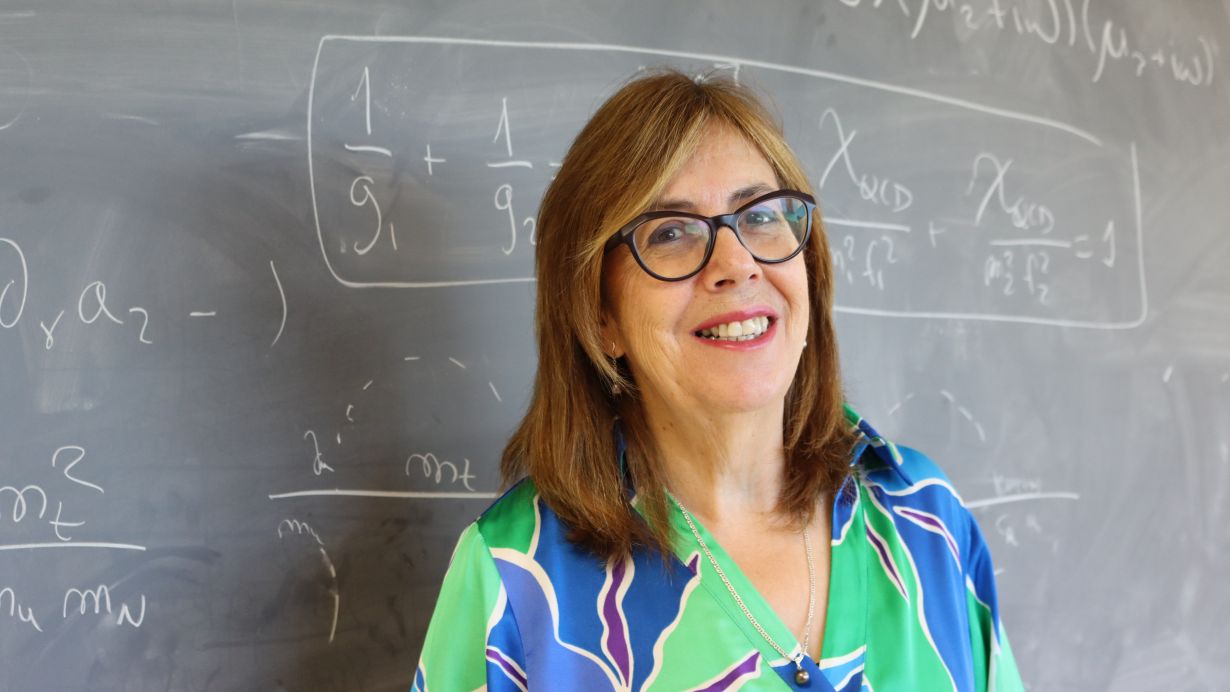The KIT Center Elementary Particle and Astroparticle Physics (KCETA) of Karlsruhe Institute of Technology (KIT) grants the 2023 Julius Wess Award to Dr. Belén Gavela, professor for theoretical physics at the Universidad Autónoma de Madrid (UAM) in Spain. She receives the award in recognition of her significant contributions in the field of theoretical and phenomenological particle physics and her outstanding role in science management. Representatives of the media are cordially invited to come to the Award Ceremony on February 09, 2024, 4.30 p.m. at NTI lecture hall on Campus South of KIT (building 30.10).
Belén Gavela is Spain's first female professor of theoretical physics. In 2003, she was a founding member of the Institute for Theoretical Physics at the UAM. Among other roles, she has held several positions at the European Council for Nuclear Research (CERN) in Geneva and at the French Centre national de la recherche scientifique (CNRS). She was coordinator of various major EU projects in the field of particle physics and a member of CERN committees.
Gavela has made significant breakthroughs in the field of theoretical and phenomenological physics, with particular emphasis on CP violation and flavor physics in quarks and leptons, the study of neutrino oscillations, and effective field theories related to electroweak symmetry breaking.
CP violation is about the assumption in the standard model of particle physics that elementary particles and their antiparticles - apart from the electric charge - behave in the same physical way. However, there are various experiments in which deviations from this assumption have been measured. CP violation is possibly the reason why there is much more matter than antimatter in the universe.
The so-called flavor is a quantum number used to describe the state of elementary particles, similar to charge or momentum. It is of relevance to processes of weak and strong interaction. In the case of strong interaction essential for the cohesion of atomic nuclei, the flavor is maintained.
About the Julius Wess Award
The Julius Wess Award is named after Professor Julius Wess, who worked for theoretical and experimental elementary particle physics and published numerous internationally famous papers during the twenty years he spent at the then University of Karlsruhe, today’s KIT. Concepts of quantum field theory, such as the Wess-Zumino anomaly or the formulation of the first supersymmetric quantum field theory, the Wess-Zumino model, will always be associated with this name. The Julius Wess Award of the KIT Center Elementary Particle and Astroparticle Physics (KCETA) is endowed with EUR 10,000. The award is granted to elementary particle or astroparticle physicists for outstanding experimental or theoretical scientific achievements, which extend and deepen our understanding of the fundamental laws of nature.
Programm
| 16:30 hrs | Musical Opening |
| 16:40 hrs | Welcome Professor Thomas Hirth, KIT Vice President Transfer and International Affairs |
| 16:50 hrs | Introduction to the KIT Center Elementary Particle and Astroparticle Physics (KCETA) Professor Anke-Susanne Müller, Scientific Spokesperson of KCETA, KI |
| 17:00 hrs | Guest Presentation “Taming the asymmetries of nature: The implications of matter-antimatter imbalance in neutrino physics” Professor Pilar Hernandez, University of Valencia, Spain |
| 17:30 hrs | Coffee Break |
| 17:45 hrs | Musical Program |
| 17:55 hrs | Laudation Professor Thomas Schwetz-Mangold, Institute for Astroparticle Physics of KIT |
| 18:10 hrs | Presentation of the Award Professor Thomas Hirth, KIT Vice President Transfer and International Affairs |
| 18:25 hrs | Presentation “The axion sum rule of quantum chromodynamics” Professor Dr. Belén Gavela |
| 18:55 hrs | Musical Program |
| 19:05 hrs | Reception |
Further Information: https://indico.scc.kit.edu/event/3920/
More information on the KIT Center Elementary Particle and Astroparticle Physics
In close partnership with society, KIT develops solutions for urgent challenges – from climate change, energy transition and sustainable use of natural resources to artificial intelligence, sovereignty and an aging population. As The University in the Helmholtz Association, KIT unites scientific excellence from insight to application-driven research under one roof – and is thus in a unique position to drive this transformation. As a University of Excellence, KIT offers its more than 10,000 employees and 22,800 students outstanding opportunities to shape a sustainable and resilient future. KIT – Science for Impact.

